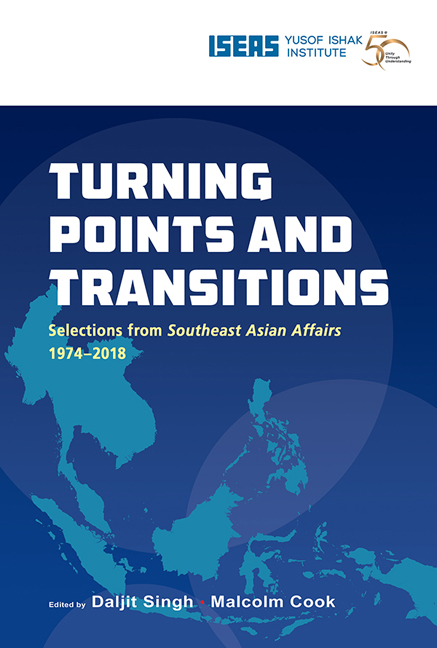Book contents
- Frontmatter
- Contents
- Message from the Director
- Foreword
- Foreword
- Introduction
- THE REGION
- BRUNEI
- CAMBODIA
- INDONESIA
- LAOS
- MALAYSIA
- MYANMAR
- Burma in 1988: Perestroika with a Military Face (1989)
- Myanmar 1990: New Era or Old (1991)
- Myanmar: No Turning Back (2012)
- Myanmar's General Election 2015: Change was the Name of the Game (2016)
- THE PHILIPPINES
- SINGAPORE
- THAILAND
- VIETNAM
Myanmar 1990: New Era or Old (1991)
from MYANMAR
Published online by Cambridge University Press: 29 May 2019
- Frontmatter
- Contents
- Message from the Director
- Foreword
- Foreword
- Introduction
- THE REGION
- BRUNEI
- CAMBODIA
- INDONESIA
- LAOS
- MALAYSIA
- MYANMAR
- Burma in 1988: Perestroika with a Military Face (1989)
- Myanmar 1990: New Era or Old (1991)
- Myanmar: No Turning Back (2012)
- Myanmar's General Election 2015: Change was the Name of the Game (2016)
- THE PHILIPPINES
- SINGAPORE
- THAILAND
- VIETNAM
Summary
The political impasse between an entrenched military regime and a restive civilian opposition that followed the massive demonstrations and protests throughout Myanmar in 1988 remained unresolved at the end of 1990. Despite the holding in May of the first multi-party general election for thirty years, with victory by its most outspoken critics, the National League for Democracy (NLD), the State Law and Order Restoration Council (SLORC) government remained in an apparently unassailable position. But faced with sporadic protests and other expressions of discontent and alienation, the military's ability to develop a new and publicly acceptable political order appeared uncertain. In the meantime, however, the economic reforms begun in 1988 continued to gather pace, though without the clear policy guidelines which might have restored confidence more rapidly. In the midst of this domestic political and economic uncertainty, foreign economic and political pressures on the government were unrelenting from major Western governments including Japan, the United States, and the countries of the European Community, though relations with most neighbouring countries continued to be strengthened. The events of the year which have led to such a mixed and contradictory summary of the condition of Myanmar are easier to identify than the causes, which remain a subject of passionate disputation.
Domestic Politics and the Election
That the election would be the central political event of the year, holding the promise of the amelioration of the nation's major political problems, was the expectation of all. As the head of the government, General Saw Maung, said in a speech to an SLORC co-ordinating meeting on 10 January,
The reason why the rule of law and order and the prevalence of peace and tranquillity is being given so much emphasis is because the Pyithu Hluttaw [People's Assembly] election to be held this year is not an ordinary one. It is an election of historic significance, a veritable milestone in the annals of history marking the change from one era to another, from one system to another and a turning point in our history itself.
Despite widespread scepticism expressed inside and outside the country that elections held by the military could be “free and fair”, and that only an interim civilian government, as demanded in 1988, could be entrusted with election management, there was general agreement that the elections themselves were conducted honestly.
- Type
- Chapter
- Information
- Turning Points and TransitionsSelections from Southeast Asian Affairs 1974-2018, pp. 494 - 506Publisher: ISEAS–Yusof Ishak InstitutePrint publication year: 2018

